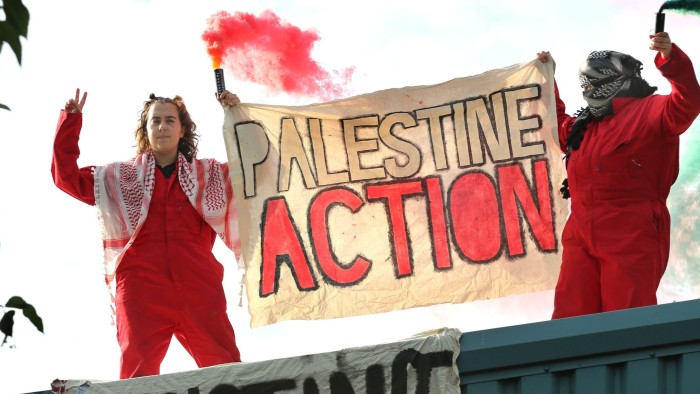Unlock the Editor’s Digest for free
Roula Khalaf, Editor of the FT, selects her favourite stories in this weekly newsletter.
MPs have voted to proscribe the campaign group Palestine Action as a terrorist organisation, despite criticism from UN experts, after its activists broke into a UK military base last month.
The House of Commons on Wednesday voted by 385 to 26 to pass the order to proscribe the pro-Palestinian activist group, which will make it a criminal offence to belong to or express support for Palestine Action.
People who do so will face penalties of up to 14 years in prison under the Terrorism Act 2000. The proscription order now goes to the House of Lords and is expected to take effect in the coming days.
Home secretary Yvette Cooper sought the ban after two members of Palestine Action broke into the country’s largest Royal Air Force base and sprayed red paint on aircraft to protest against Britain’s military support for Israel.
Security minister Dan Jarvis on Wednesday argued that Palestine Action had “crossed the threshold from direct criminal action into terrorism”.
“Essential as [the rights to protest] are, they do not provide a blank cheque for this particular group to seriously damage property or subject members of the public to fear and violence,” he added.
The order proscribed Palestine Action alongside two other groups — the white supremacist Maniacs Murder Cult and the ethno-nationalist Russian Imperial Movement, which seeks to create a new Russian imperial state.
Palestine Action has organised increasingly disruptive protests in recent years against the UK government and businesses that it says enable the Israeli military, including through weapons sales.
Its activities have intensified in response to what it has called Israel’s “genocide” in Gaza, an accusation that the Israeli government has strongly rejected.
The group has said it will attempt to challenge the ban in the courts if it is passed as expected by parliament.
Independent MP Zarah Sultana criticised the ban in the Commons on Wednesday, calling it “a deliberate distortion of the law to chill dissent”.
“To equate a spray can of paint with a suicide bomb isn’t just absurd, it’s grotesque,” said the former Labour MP.
On Tuesday a group of United Nations special rapporteurs criticised the ban, warning it would “have a chilling effect on political protest and advocacy generally in relation to defending human rights in Palestine”.
“Mere property damage, without endangering life, is not sufficiently serious to qualify as terrorism,” they said.




